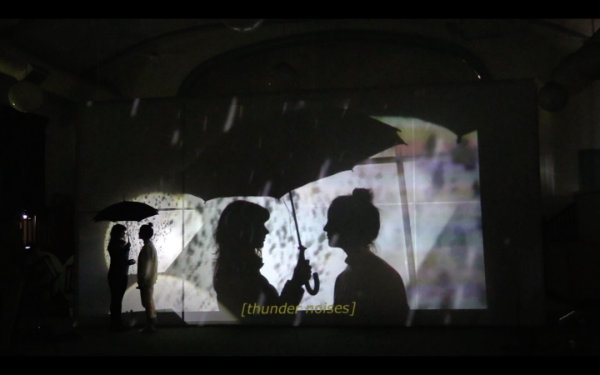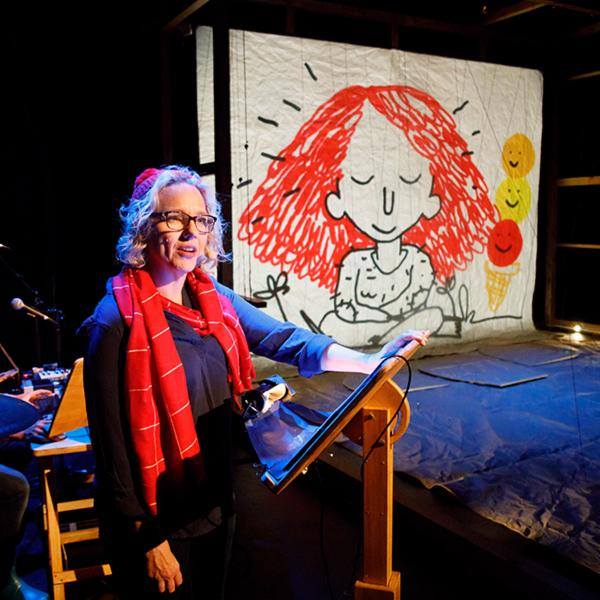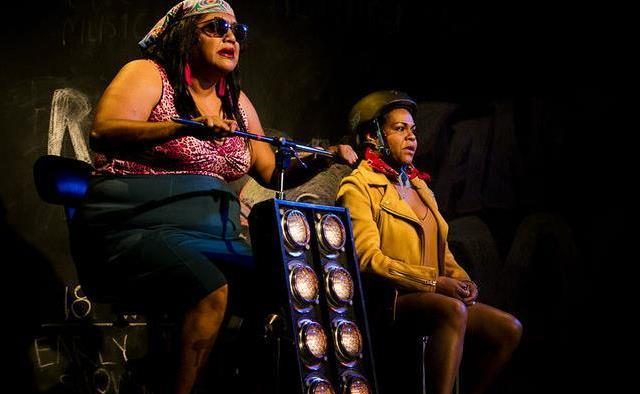Everyone needs mentors and everyone needs advice, but when you’re starting out in the arts industry it’s sometimes hard to find the right people to talk to about some of your questions and concerns. If you’re an aspiring director, or just starting out in the field, we’ve made it easier for you with this array of insightful tips from directors in six different states and territories.
Leticia Cáceres
Direct shows for young audiences: The best way to test your directorial talent is to make a show that can hold the attention of a room full of Year Nines. Bonus points if you can make a schools touring show that can play in a posh private school theatre, as well as the drama classroom of a rural state school.
Work with new writers on new plays: The film industry has a great saying, ‘write to shoot, shoot to cut’. The stage is no different. A director has to learn the skill of collaborating with a playwright to develop a play so it’s ready to be rehearsed, and then develop the nose to cut and refine that play on the floor, ready for an audience. This is the only way to hone your storytelling skills.
Don’t be a stick in the mud: Theatre is a collaborative art. If you don’t listen and stay open to creative offers and ideas, and just dictate and impose, then more often than not, your show will remain small, and pedestrian. The best work happens where a group comes together and bounces ideas off each other, allowing the production to take on a life of its own. The real skill of the director is in knowing when to stop accepting offers and how to sculpt those offers into a gripping night in the theatre.
Leticia Cáceres is a multi award-winning theatre and film director.
Tim Watts
Play hard: Play is at the centre of all the shows I make, both in the process and in the final product. It’s an energy that I try to cultivate in the room, where there is a camaraderie between the artists and everyone is finding joy in the act of making. Sometimes we’re literally playing with toys, using them as puppets or shadows and we explore their possibilities and use that to inspire the story. Whatever the form, the show is typically born out of a lot of trial and error; improvisation, and experimentation fueled by curiosity. And this means a lot of playing, not being precious with ideas, just throwing everything out there and finding the best game. Game play comes into all the work I make. Whether it’s the game of watching performers try to get into their spots in time or the interactive theatrical shows I’ve made, it’s about the audience getting a thrill out of the way we’ve made the magic work. They can see the strings and that adds to the excitement and satisfaction.
Fail: One of our rehearsal mottos is ‘fail early, fail often’. We look for the crazy ambitious ideas and test them as soon as possible. We are never satisfied by something looking ok; we want it to be the best it can be. No idea is put aside as too difficult, no matter how impossible it seems, we will always try to find a way trial it on the floor. This often looks like a short period of speculating on the viability of the idea and then a mad scattering of people around the space to build mock ups of whatever we need to do the experiment. Makeshift props, puppets, lighting states, soundscapes, scrounged from YouTube and junk around the room. We get to test time as soon as possible and throw it all on stage to see if it flies.
Trust: Trust your collaborators. The people in your room are smart, creative, resourceful and dedicated to making the work the best it can be. They have so much to offer to the process and they will be generous with their ideas if you listen. And trust yourself – your gut is usually right and you should listen to it. This is particularly important is a highly collaborative room, where there will be many voices, many conflicting ideas, and in the end you have to trust that you will make the right decision. As I’ve progressed, I have come to have more trust that a devising process will result in something. I now know that I don’t have to start with anything at all, if I don’t want to, because experimenting will draw ideas out. In fact, it’s often better if I do start with nothing. Not knowing how to begin is a big problem for a lot of artists when starting out, because they’re worried it won’t be any good. I guess I’ve learned how to start, by trusting that it will get better.
Director, deviser, performer and puppeteer Tim Watts is one of the founding members of Perth theatre collective The Last Great Hunt.

Caroline Stacey
Do the legwork: Preparation is everything. Develop research processes in relation to your source material, your collaborators, the context of the work and potential audiences, so you have all the layers of detail required to fully make the work sing. Identify any major difficulties in realising the work and address them as imaginatively and effectively as you can. Distill all of this information so the core of the work is able to be met by your audience unequivocally.
Delegate! Delegate! Delegate!: Directing is a collaborative enterprise and delegation is critical regardless of the scale of work you are making. Entrust your creatives, performers, and colleagues to fully own their roles and craft and welcome having your concepts, ideas and impulses interrogated, challenged, and enhanced. Work to enable rather than control. Find and build your working relationships and teams energising and encouraging each other to be curious in the pursuit of excellence.
Back yourself: Reduce pressure on yourself by organising your life so you have a steady income that enables you to meet your basic living expenses whilst providing the flexibility to generate self-driven projects and/or say yes or no to directing work offered. Be fully available to your colleagues, develop your powers of observation and the ability to act on your own intuition and feelings in all circumstances. Be loyal to yourself and others.
Caroline Stacey is the Artistic Director and CEO of the Street Theatre, Canberra.
Beng Oh
Choose works with resonance: Only direct plays and productions you can form a personal connection with. The text, script, concept or treatment needs to resonate with you before you can meaningfully engage with it. These personal connections are your starting points for exploration and rehearsals. They’re the things you keep thinking about and coming back to. If necessary, keep rereading a text and thinking about a project until you find at least three genuine personal connections. If you can’t connect with a play, don’t direct it.
Be wary of terminology: Unless you have all come out of the same drama school or have been training together in the same method, acting terminology can be fraught. Everybody has a slightly different understanding of the meaning and application of terms like objective, super objective, through-line, etc. Confusion can easily arise if you’re not careful. When in doubt, stick to plain English.
Recast if necessary: We love actors and we cast them in the expectation and hope that they’re the best person for the part. Having said that, mistakes can and do happen. If an actor is behaving badly, or over-parted and really struggling, or simply won’t take your direction, it’s your responsibility to recast even if you’re midway through rehearsals. It’s a disruptive step and one that you hopefully won’t do more than once or twice in your career, but your responsibility is to the production as a whole.
Beng Oh is a Melbourne-based independent director.
Kate Gaul
Be kind: It’s hard putting your ideas, passion and skills on the line in front of an audience. It’s hard to find the resources of time, money and space to create great work. It’s hard to face critics. It’s hard to work consistently and rigorously and fail and do it again. But we do. So let’s be kind, generous and patient with each other.
Be curious and courageous: Choose work that challenges, mystifies, disturbs and seduces you. I admire courage in others and seek it for myself. For me, being an artist means being curious, asking questions and keeping committed to an individual journey of exploration and discovery – giving form to the uncertainty that’s informed in part by personal experience.
Ask questions; let the actors find their way: Your vision is underpinning every aesthetic choice you make. There’s no need to hammer away with your ideas and proposals in the rehearsal room. Ask your expert colleagues in the creative team what they think. Give your actors the chance to play; ask them what their impulse is; say you don’t know; and I guarantee they will find better solutions to staging, interpretation of a moment, a climax, a transition – a good director is the one who can spot the best idea in the room and isn’t afraid to run with it!
Kate Gaul‘s recent productions include The Magic Flute for Opera Australia and The Past is a Wild Party for Siren Theatre.
Richard Carroll
Include the audience: Theatre is theatre because the audience are present. Otherwise, why not just stay home and watch Netflix? Gathering with a group of people to share a story is such an ancient ritual for humans; there’s something primal about it that resonates in our bones. Don’t let the audience feel like you forgot they were going to be there.
Ask ‘why not?’: Sometimes there are very good reasons for conventional theatre practices, and it can be fun and useful to explore what those are for yourself. Sometimes, however, breaking the rules produces something new and exciting for both the theatre makers and the audience. Think also about the skills of your performers. If, for example, you’re working with a great improviser, you can trust them to do that within your show – so make the most of it.
Read: So you want my arts job: Director, Independent Theatre
Remember you could be working in a bank: Making theatre is real work, and should be treated as such. This includes behaving professionally at all times, and expecting to be appropriately recompensed for your work, etc. However – there are plenty of other careers that offer much more reliability, or better financial prospects, or both. Don’t lose sight of why you bust your gut to be in this business. If you’re really lucky, this shouldn’t feel like work. And if you start to resent the job, or stop looking forward to going to work, you’re doing something wrong – so make a change.
Richard Carroll is the co-artistic director of Hayes Theatre Co (Australia).
Sam Routledge
The performers are your greatest asset: This came to me from the great Rose Myers when I was performing in Pinocchio in Adelaide. When developing new work, even in design driven processes, use your performers to solve problems. They can change the way time works in a space, shift setting and occupy the audience while something technical needs to occur.
Say “I don’t know”: If you’re asked a question by an artist you’re working with and you don’t know the answer, say “I don’t know”. You can be confident that the answer will arrive, while also being confident that you don’t know yet.
Be upfront with your expectations in regards to bullying and harassment: When you are starting off you may be working with your friends and so have a good rapport. As you are the leader in the room, you must be clear from the beginning that any bullying, harassment and sexual harassment will not be tolerated, and in doing so update people with examples of what constitutes these things. This may feel silly when saying these things to people you are close with or who you assume know these things but nothing replaces saying it loud.
Sam Routledge is a creator and director of contemporary performing arts for intergenerational audiences and the Artistic Director of Terrapin Puppet Theatre.

Jason Klarwein
Find balance: As a person with a very changeable mind, I find ‘sticking to my guns’ very hard to do. I guess the ultimate balance is the most desirable. Not to be too stubborn nor too flexible. This not only relates to actors but to production departments as well. There are some ‘battles’ you can afford to lose. This does make negotiating for others easier. When to ask is the biggest struggle. The timing is everything. Asking something from an actor or a production department at the wrong time can set off a chain of events you don’t really have time for. Being hyper-aware of ‘timing’ is the best solution for the problem of ‘sticking to you guns’. And ask yourself, “Will this really make a huge difference in the eye of the audience?”
Active listening: I regard listening as the greatest skill an actor can have. And by listening, I don’t mean reacting. Listening with everything. My friend and colleague Jimi Bani has a word in his language Kala Lagaw Ya. The word is Thalinga. It means deep listening. A cultural listening. When an actor is tired or strained, or needs a new way of looking at a moment, this type of listening is very important. It helps me as the director to release an actor from a potential moment. To see something anew or grasp something on a deeper level without my instruction. To gain knowledge together. It is the most empowering way to make something. To own it together.
Empower your actors: Creating a safe space is quite a tricky thing to do in the current climate. On one hand, we are now super-vigilant to situations involving intimacy and violence and on the other, we desire a working space in which we are free to create without judgement. We have Occupational Health and Safety and Harassment guidelines for very good reasons but companies can also be too vigilant. Actors become stifled and afraid to make bold choices. Guiding and encouraging a rehearsal room of empowered actors who have ownership over decisions that are being made for the greater good of the production is a nuanced process of listening and responding. Feeling your way together as a group of actors, stage managers and designers with a common goal is best but there is no road map for any one group of creators. The play dictates the space. But common sense and humour usually broker most freedoms.
Jason Klarwein is a producer, director and actor who is also the Artistic Director of Grin and Tonic.
This article was first published by ArtsHub Australia in 2019.




